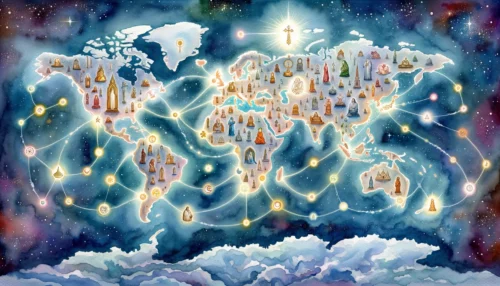The Baha’i faith is an independent world religion that has gained popularity in recent decades. Many people are drawn to its inclusive and unifying message, but how does it compare to the teachings of the Bible? In this article, we’ll take a closer look at the Baha’i faith from a Biblical perspective, and discuss the main points of contention between the two belief systems. Our goal is to provide a better understanding of the key differences, and whether or not these differences are problematic for a Christian believer.
The Origins and Teachings of Baha’i
The Baha’i faith was founded in the mid-19th century in Persia, which is now modern-day Iran, by a man named Mirza Husayn-Ali, who took on the title Baha’u’llah, meaning “the Glory of God.” Baha’u’llah claimed to be a Manifestation of God, a unique individual who was divinely inspired to reveal God’s will and guidance to humanity. The Baha’i faith teaches that these Manifestations of God have appeared throughout history in various forms, such as Abraham, Moses, Buddha, Jesus, and Muhammad, among others.
Baha’i adherents believe that each Manifestation of God has brought a new set of teachings and spiritual guidance to suit the needs and conditions of their time. Baha’u’llah, as the most recent Manifestation, is seen as having brought the latest message from God, one that is meant to unify humanity and bring about global peace and justice.
Some key teachings of the Baha’i faith include the oneness of God, the oneness of religion, and the oneness of humanity. Baha’is believe that all major world religions are essentially different expressions of the same divine truth, and that all people are equal regardless of their race, nationality, or gender. The faith emphasizes the importance of education, social justice, and the elimination of prejudice.
Baha’is also believe in the concept of progressive revelation, which means that God sends new spiritual guidance and teachings to humanity over time. According to this belief, each Manifestation brings a new “chapter” of divine revelation that builds on and expands previous ones. This idea is reflected in the Baha’i quote: “This is the changeless Faith of God, eternal in the past, eternal in the future” (Baha’u’llah, Gleanings from the Writings of Baha’u’llah, p. 136).
In terms of scripture, Baha’is have their own sacred texts, such as the Kitab-i-Aqdas (the Most Holy Book) and the Kitab-i-Iqan (the Book of Certitude), which contain the teachings and revelations of Baha’u’llah. However, they also recognize the sacred texts of other religions, like the Bible, the Quran, and the Bhagavad Gita, as containing divine guidance and wisdom.
The Baha’i faith is a global religion, with its administrative center located in Haifa, Israel. The Baha’i World Centre is the spiritual and administrative heart of the faith, and it is the site of the Universal House of Justice, the supreme governing body of the Baha’i world community.
Baha’i and Christianity: Key Differences
While the Baha’i faith acknowledges Jesus Christ as a Manifestation of God, it differs from Christianity in several fundamental ways. The following are some key differences between the two faiths:
- The nature of Jesus Christ: In Christianity, Jesus Christ is considered the Son of God, who became incarnate, taking on human form, to save humanity from sin and death through his death and resurrection. As it is written in the Bible, “For God so loved the world that he gave his one and only Son, that whoever believes in him shall not perish but have eternal life” (John 3:16). In contrast, the Baha’i faith sees Jesus as one of many Manifestations of God, not uniquely divine, and believes that Baha’u’llah has brought a more recent revelation superseding Jesus’ teachings.
- The Holy Trinity: Christianity upholds the concept of the Holy Trinity, which is the belief in one God who exists in three persons – the Father, the Son (Jesus Christ), and the Holy Spirit. The Bible says, “Therefore go and make disciples of all nations, baptizing them in the name of the Father and of the Son and of the Holy Spirit” (Matthew 28:19). The Baha’i faith, however, does not accept the doctrine of the Trinity and instead emphasizes the oneness of God.
- Salvation: Christianity teaches that salvation is a gift from God, received through faith in Jesus Christ as the savior, who died for humanity’s sins and was resurrected. The Apostle Paul wrote, “For it is by grace you have been saved, through faith—and this is not from yourselves, it is the gift of God—not by works, so that no one can boast” (Ephesians 2:8-9). The Baha’i faith, on the other hand, does not hold a specific doctrine of salvation but emphasizes individual spiritual growth, service to humanity, and unity among people and religions.
- The authority of the Bible: Christians believe that the Bible is the inspired Word of God and the ultimate authority for their faith and practice. The Bible states, “All Scripture is God-breathed and is useful for teaching, rebuking, correcting and training in righteousness” (2 Timothy 3:16). While Baha’is recognize the Bible as a sacred text containing divine guidance, they also believe that it has been superseded by the revelations of Baha’u’llah, which are seen as the most recent and relevant message from God.
- The Second Coming of Christ: Christianity teaches that Jesus will return to Earth in the Second Coming to judge the living and the dead, as stated in the Bible: “For the Lord himself will come down from heaven, with a loud command, with the voice of the archangel and with the trumpet call of God, and the dead in Christ will rise first” (1 Thessalonians 4:16). The Baha’i faith, however, views Baha’u’llah’s arrival as the fulfillment of various prophecies regarding the return of a divine figure, not specifically the Second Coming of Christ.
These differences in beliefs and teachings highlight some of the fundamental distinctions between Christianity and the Baha’i faith. While both religions share certain values and spiritual principles, their core doctrines and understanding of God, Jesus Christ, and salvation diverge significantly.
Potential Conflicts with Biblical Teachings
As we have seen, there are several key differences between Christianity and the Baha’i faith. For Christians, these differences may present potential conflicts with their biblical beliefs. Here are some notable areas of concern:
- The exclusivity of Jesus Christ: According to the Bible, Jesus Christ is the only way to salvation and reconciliation with God. Jesus said, “I am the way and the truth and the life. No one comes to the Father except through me” (John 14:6). The Baha’i faith, however, teaches that there have been multiple Manifestations of God throughout history, including Baha’u’llah as the most recent one. This belief may conflict with the Christian understanding of Jesus as the exclusive path to salvation.
- The finality of Jesus’ revelation: Christianity teaches that Jesus’ life, death, and resurrection represent the complete and final revelation of God’s plan for humanity’s salvation. In the book of Hebrews, it is written, “In the past God spoke to our ancestors through the prophets at many times and in various ways, but in these last days he has spoken to us by his Son, whom he appointed heir of all things, and through whom also he made the universe” (Hebrews 1:1-2). The Baha’i faith’s concept of progressive revelation, with Baha’u’llah bringing a more recent message from God, may contradict the Christian belief in the finality of Jesus’ revelation.
- The authority of the Bible: For Christians, the Bible is the ultimate source of spiritual guidance and authority. The Baha’i faith, while recognizing the Bible as a sacred text, also believes that Baha’u’llah’s writings supersede it. This view may challenge the Christian conviction in the Bible’s unique authority and inspiration.
- The nature of God: The Christian understanding of God as a Trinity – Father, Son, and Holy Spirit – is a central tenet of the faith. The Baha’i faith’s rejection of the Trinity and emphasis on the oneness of God may be seen as conflicting with the Christian doctrine of the Triune God.
- The Second Coming of Christ: Christians anticipate the return of Jesus Christ in the Second Coming, as prophesied in the Bible. The Baha’i faith’s interpretation of Baha’u’llah’s arrival as the fulfillment of these prophecies may be seen as incompatible with the Christian expectation of Jesus’ return.
While the Baha’i faith and Christianity share some common values and spiritual principles, there are fundamental differences in their core doctrines and beliefs that may present conflicts for Christians. It is essential for believers to understand these distinctions and engage in thoughtful and respectful dialogue when exploring the relationship between these two faiths.
Finding Common Ground
As we have explored the Baha’i faith from a Biblical perspective, it is clear that there are significant differences between the two belief systems. While some aspects of the Baha’i faith might be appealing or intriguing, it is essential for Christians to thoughtfully consider the potential conflicts with their own beliefs.
To further reflect on the topic, ask yourself the following questions:
- How do the differences between Christianity and the Baha’i faith affect my understanding of my own faith?
- In what ways can I engage in respectful and open-minded dialogue with those who hold different beliefs?
- How can I continue to grow in my own spiritual journey, while maintaining a spirit of love and understanding towards others?
It is crucial to remember that, as Christians, we are called to love our neighbors, even those with whom we may disagree. By embracing this spirit of love and seeking understanding, we can find common ground and work together to promote peace, justice, and unity in our world.














